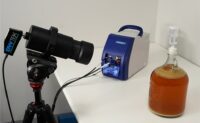Raman spectroscopy is a non-destructive, non-invasive technique that is an excellent alternative to traditional process-monitoring methods that require sampling. Raman provides real-time information on the state of the bioreactor. In our previous blog post – St. Patrick’s Day at Beer&W Tek! we demonstrated how the fermentation process is monitored using an i-Raman EX, a 1064-nm laser laboratory instrument, with RIS101 Sapphire Ball Immersion Shaft. In this post, we take the next step of performing non-invasive, stand-off monitoring of the brewing process with a RTS202 Stand-off lens (Figure 1). This allows us to gather real-time information on the state of the bioreactor without the risk of disruption or contamination. Continue reading →
Raman spectroscopy is a promising technique in food science due to its ability to provide rapid and non-destructive analysis of samples. For instance, we have previously explored the Raman spectra of olive oils using the B&W Tek i-Raman® Plus-785 system (Fast Ingredient Analysis of Edible Oils Using a Portable Raman Spectrometer). Regular Raman spectroscopy can be applied to investigate properties of traditional/herbal tea, and when Raman is coupled to SERS technology it can be used to detect trace pesticides (ug level) on tea leaves (Trace Detection of Paraquant in Tea Leaves)… Continue reading →
Fall is a season of harvest and festivals, which makes it an ideal time to get outside while the weather … Continue reading →
You may have heard of vegetarian-friendly foods like cauliflower burgers and the Impossible Burgers for example. Both are created to … Continue reading →
Milk from cattle and other domestic livestock has been an important food source for humans for thousands of years. The … Continue reading →
 Looking for something specific?
Looking for something specific?













